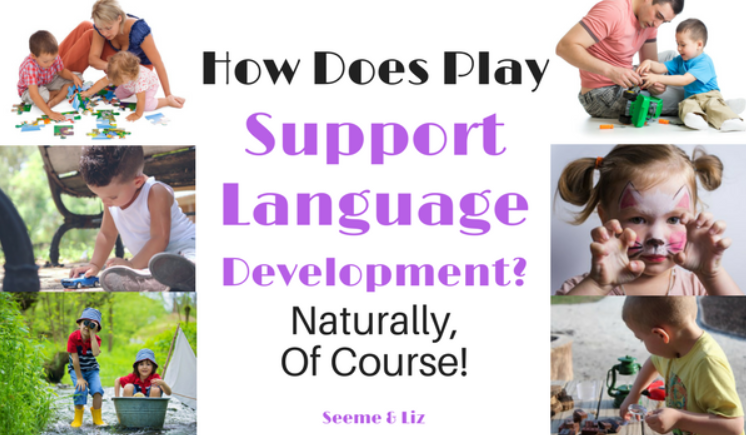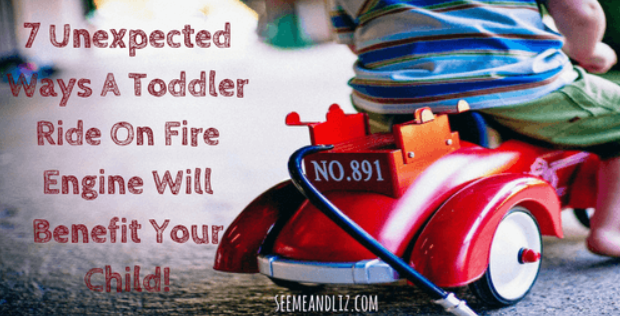Dramatic play is the best form of play for language skill building, however all forms of play will support language development.
Keep in mind that you are your child’s best teacher so by being involved in her playtime (not always, they do need space to explore on their own) you can help her language skills develop.
Did you know that having good oral language skills is essential for a child to be successful at school?
It really doesn’t matter if he can count to ten or recite his ABC’s if he has difficulty coming up with novel sentences.
Academic skills can be learned after the foundations have been set!
And these foundations, including speech and language skills can and should be learned through play!
One thing I want to point out is that language development is more than just saying words or sentences.
Language development encompasses skills such as problem solving, critical thinking, cause and effect, spatial concepts, etc.
Here are a few ways to stimulate some stellar language skills just by playing!
How Does Play Support Language Development?
Babies and Play
At this stage play is all about sensory exploration.
Everything is new to a baby, including her senses.
She is hearing, touching, tasting, smelling and seeing things for the first time.
What You Can Do To Help
Offer your baby simple and safe objects and toys that can be explored using a variety of senses.
This is playtime for a baby. If you give him a rattle, watch as he figures out that it can make noise when he moves it up and down.
Take this time to label some of the things you see.
For example “Look at your rattle, it’s so________”, “there you go, you are shaking the rattle”, etc.
When your baby is “playing” with a toy, label the toy – give it a name. Also talk about what your baby is doing with the toy.
For babies, it is important to keep toys as basic as possible.
There is no need for anything fancy. Especially if it claims it will turn your baby into a genius.
So throw away the talking toys and flashcards and keep it simple.
In fact, even a Tupperware container will do!
Babies also love social games such as peekaboo, tickles, bouncing up and down on a parents knee, etc.
While playing these kinds of games talk a lot. Use motherese to keep your baby engaged.
Use sounds to facilitate back and forth turn taking.
For example, look at your little one intently and say “babababa”, pause and wait to see if he will respond by either smiling, vocalizing or imitating your sounds.
Check out these great toys for babies (and I share many speech and language tips with each toy).
Toddlers and Play
Toddlers love getting into everything.
If you have one you know what I am talking about.
But their curiosity and need for exploration leads to some great play time, which in turn will help with the development of language.
What You Can Do To Help
Follow Your Child’s Lead
If your toddler is interested in something and you go along with that, there is a much better chance that she will stay engaged and be interested in what you have to say about the topic.
As a result there will also be more opportunities for language development.
Let’s take blocks as an example.
If your child wants to play with the blocks, sit beside him and play with some blocks too.
Watch what he does with his blocks and imitate him. You might get a few laughs.
Be sure to label what is going on.
Because you have followed his lead, he will listen to what you have to say.
If you are building a tower you could say “I’m putting the block on, your turn. You put a block on”. In this simple scenario your toddler is learning the spatial concept of “on”.
Or maybe he would prefer to hide a block “under” something or put it “in” a box.
You do not have to do any explicit teaching.
Keep the interactions as natural as possible.
Turn Taking
Turn taking is an important part of language development as it is what makes up conversations.
If one person does all the talking, the other communicative partner will get bored and tune out.
This is quite advanced for young children and the most primitive form of turn taking starts during play.
While playing with your child take turns during an activity.
If we go back to the blocks example, your child could add a block to the tower and then you could say “now it’s my turn” and then you add a block.
As children get older, turn taking becomes important not only in carrying on a conversation, but it more organized games as well.
This is a very important skill that starts to develop just after birth!
Examples Of Toddler Toys For Language Development
I won’t list all of the toys here as I have several articles dedicated to toys for toddlers.
But as I said above in the baby section, keep toys simple.
Much more learning and playing can be done with toys that do not require batteries.
Check out these great toys for toddlers. Again, each toy will have some speech and language suggestions.
Preschoolers and Play
This is where it gets fun!
Preschoolers really start getting into dramatic play.
They have had a few years to build some foundations through simple play and have learned many skills. But the play doesn’t end there.
Now it becomes fun, imaginative and often based on something the child(ren) has experienced.
This is why playing “house” is so common during the preschool years. But don’t take playing house for granted. And get involved from time to time.
Your child may want you to take on the role of the family pet though.
What You Can Do To Help
Offer open ended toys and play scenarios such as a play kitchen and accessories, dolls and accessories, cars, trucks, pop up tents, storage containers, blocks, etc.
Be A Good Speech Model: Expand and Extend
If you are playing with your child, listen to what he is saying.
For example, if he says “I’m the baby so I get the small bed” you could say “that’s right, that bed is tiny, perfect for a baby”.
Did you notice I changed the word “small” to “tiny” and added some more words?
This is a great way to introduce new vocabulary through play.
You can also make grammar corrections subtly this way.
If you and your child are playing “airport”, for example, and she says “I drived the plane really fast” you could say “that’s right, you flew the plane so fast, it scared me a bit”.
Notice I corrected the word “drived” with “flew” and then added an emotion.
Now this opens the door to talk about things that might scare her or you.
Make Playtime Count
Don’t feel that you need to be involved in your child’s play all the time.
Not only is this not feasible but children also learn many important skills through unstructured child led play (with no adult involvement).
But, it is also important that you engage your child in play from time to time, and when you do, you give yourself 100% to his play time.
You will need to find a balance that works for you and your family.
Parental involvement in play is especially important in a child’s first 3–4 years of life as there is so much to be learned and discovered.
By joining in on their play you can help come up with new play possibilities as well as be a good language model by helping them learn new vocabulary, social skills and problem solving.
Remember, language development happens by interacting with others.
Unfortunately (or fortunately, depending on how you look at it) there is no app or TV program that will build a child’s language skills.
I hope I have helped to show you that YES, play does support language development!
Every child needs to be given the gift of play.
Both child led and adult guided forms are necessary for learning to occur.




